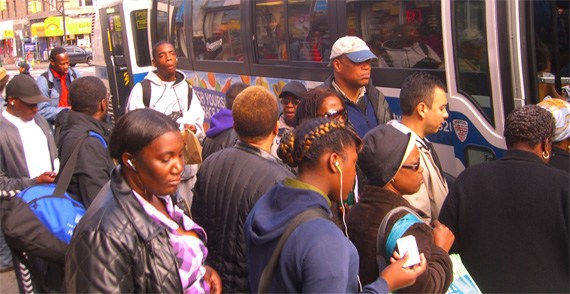As bus ridership continues to fall in NYC, one of the most promising upgrades to speed up service and win back riders is all-door boarding. The MTA's impending approval of a $1 billion contract with Cubic Transportation Systems for a new fare payment platform [PDF] sets the stage to adopt all-door boarding on every bus route, but the agency still hasn't committed to implementation. It's going to take constant pressure to deliver this essential service improvement, advocates say.
All-door boarding saves bus riders substantial time, especially on the most crowded routes, by eliminating one-by-one fare payments at the front of the bus. It's one of the headline recommendations of the Bus Turnaround Coalition.
New York has already fallen behind cities like London and San Francisco on implementation. The need to make the switch is gaining added urgency as slow buses lose ground to services like Uber and Lyft. Without upgrades like citywide all-door boarding, buses will keep shedding passengers.
The MTA has hesitated to commit to all-door boarding, however, and the contract with Cubic, approved unanimously by the MTA Board's finance committee yesterday, shows the agency is still in no rush. It includes a pilot of all-door bus boarding on some lines but no firm commitment to citywide adoption, and the timetable calls for MetroCards to remain in use until 2023.
The capability for citywide all-door boarding will be embedded in the new fare payment technology. Riders will be able to pay fares with mobile devices or reloadable cards that can be scanned with a tap via readers at any door of the bus.
While that's encouraging, experience shows there are no guarantees. The MetroCard, introduced more than two decades ago, enabled benefits like unlimited ride passes, but it took rider advocacy to make them a reality.
"When the MetroCard came in parallel to the token, it was basically a plastic token," said TransitCenter's Jon Orcutt. "The technical capabilities were there, but the policy changes had to be forced from outside the agency."
In addition to all-door boarding, the new system will make it easier to implement more flexible fare options, like fare-capping or reduced fares for low-income riders, which are features of the Cubic-designed fare system in London.
"The technology is there, the question is whether the MTA and the city are ready to use it to accomplish deeper goals," said Riders Alliance Executive Director John Raskin. "Having to transition to a new fare payment system also will allow the MTA to do other things that could make the system more accessible and inclusive."
The Cubic contract spells out five phases, starting with the launch of payment via mobile app or bank card, which will be accepted at 500 turnstiles and on 600 buses within 18 months of the notice to proceed, MTA staff told board members yesterday. That should be sometime in 2019.
By the end of the second phase, 35 months after the start of the contract period, every turnstile and bus in the system will accept contactless payment. In the third phase, the MTA will roll out its own contactless fare card, create a "robust retail sales and reload network" where people can add value to their cards at businesses throughout the city, and integrate the new system into a single app that also includes mobile ticketing for the Long Island Railroad and Metro-North. In phase four, the agency will roll out its fare card vending machines at stations, and the last stage will phase out MetroCard readers.
The second phase will include "trials of on-board fare collection and all-door boarding" on Select Bus Service routes. On its own, that doesn't represent much progress toward bringing all-door boarding citywide, since SBS routes already have a more primitive form where riders pay fares at vending machines on the curb.
And that's the only mention of all-door boarding in the contract. Ultimately, it's going to be on riders to advocate for this critical improvement.






